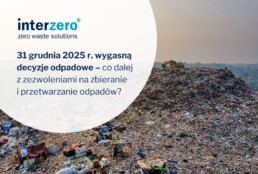
31 December 2025 waste decisions will expire - what next for waste collection and treatment permits?
On 31 December 2025, existing administrative decisions for waste collection, treatment and generation will expire by law. This means that with the start of the new year, many waste management companies will lose their ability to operate. However, the government is working on legislation that will extend the validity of the decisions and prevent paralysis of the waste industry.
Reasons for expiry of the waste management decision
Waste management decisions are the cornerstone of the waste industry. As early as 31 December 2025, however, many of them may expire. This follows from the provisions of the Waste Management Act (Article 226a) and the Environmental Protection Act (Article 193(1c))which indicate this very date as the cut-off date, and this even for entrepreneurs who have applied for new permits and licences at least three months before the expiry of the period for which the earlier decisions were issued.
From 2022. the Marshall Offices, which handle the majority of such cases, cannot cope with the flood of applicationsand decision-making procedures drag on for years. Meanwhile, the deadline for the expiry of decisions is approaching inexorably - all entrepreneurs who fail to obtain new permits and approvals must expect to have to suspend their activities after the New Year.
Amendments to laws will extend the validity of decisions. Until when?
Following appeals from, among others, representatives of the steel industry, the Ministry of the Environment drafted an amendment to the Waste Management and Environmental Protection Acts, which envisaged the following automatic renewal of expiring decisions. By how much? The SME Ombudsman called for postponing the deadline by 3 years, i.e. until 31 December 2028. In the first version of the bill, the Ministry of Climate and Environment proposed a 2-year period (until 31 December 2027). In the course of the legislative work, the Ministry of Climate and Environment withdrew from this idea and instead of 2 years gave entrepreneurs only 6 additional months to obtain a new decision. The law currently under way extends the validity of permits and authorisations only until 30 June 2026.
As the explanatory memorandum to the bill reads:
As of 31 December 2024, there were approximately 1,410 applications pending to bring administrative decisions into line with the Fire Act. This represents approximately 13 % of all applications submitted. The largest number of administrative proceedings is on the part of provincial marshals (according to the aforementioned state, these bodies had 1,070 applications pending). Taking into account the scale of the proceedings conducted by the provincial marshals, a detailed analysis of the adaptation stage was carried out, which shows that as of 1 January 2026, approximately 307 applications for adaptation of the decision will remain to be considered.
Will we have time to adopt the amendment?
The bill, which is being processed under the number UDER39, did not reach the Council of Ministers until the end of September 2025. At this point, therefore, there is no certainty that the new legislation will be adopted and enter into force on the planned date (i.e. 1 December 2025). If the parliament does not deal with the matter soon, the spectre of an interruption in waste collection will become real after 1 January 2026. Experts predict that the need for some waste companies to suspend operations may cause serious waste management problems at the municipal level - The cost of transport and thus the charges for residents may increase. In the worst-case scenario, waste will cease to be collected from properties.
It is not only entrepreneurs, but also local authorities, who are already calling for the legislative work to be speeded up and the deadline for previous decisions to be extended not by six months, but by a minimum of one year. However, the Ministry of the Environment is closing the door to any conjecture:
30 June 2026 is the cut-off (final) date for the extension of existing administrative decisions. After this date, it will no longer be possible to extend the aforementioned decisions. In the event that the time for which the existing decision was issued has expired and the procedure for issuing a new decision is not completed before 1 July 2026, the earlier decision will expire by operation of law on that date. This effect will take place irrespective of the date of the application for a new permit.
Paralysis of Marshal Offices main cause of problems
The massive influx of applications for permits and licences is due to several factors. Firstly, in 2024 and 2025, the 10-year expiry date of many decisions issued in 2014-2015 was coming to an end. Secondly, the introduction of the Fire Act forced waste management operators to adapt their decisions to the new fire protection requirements. In both of these situations the number of pending applications has increased exponentially, which, combined with the ongoing handling of first-time applicants, has led to a prolonged paralysis of marshal offices.
Faced with this situation the validity of previous decisions has already been extended once. In 2022, the aforementioned Article 226a was introduced into the Waste Act and Article 193(1c) was introduced into the Environmental Protection Law, which automatically postponed the expiry date of all decisions to 31 December 2025, provided that the entity concerned applied for a new decision at least 3 months before the expiry of the previous one. Will the additional 6-month period planned by the Ministry of the Environment prove sufficient? And will the parliament accept the ministry's proposal in this shape and timeframe?
The fate of the ministerial bill can be followed on the website of the Government Legislation Centre.